In San Diego, discerning when an insurance company acts in bad faith is essential for policyholders seeking fair claim resolution. Key indicators include unreasonable delays in processing claims, unexplained denials of valid claims, and lowball settlement offers, all suggestive of an insurer’s breach of duty. Such tactics, alongside lack of communication and misrepresentation of policy terms, may necessitate legal intervention to uphold policyholder rights and secure justice. Can you identify these warning signs yourself?
Unreasonable Delays in Processing Claims
When evaluating whether an insurance company is acting in bad faith, one critical sign often observed is unreasonable delays in processing claims. Such delays frequently arise when an unresponsive adjuster is involved, leading to prolonged waiting periods for policyholders seeking resolution. This lack of communication can be indicative of systemic inefficiencies or deliberate stalling tactics. Additionally, a biased claim assessment may accompany these delays, where adjusters unjustifiably favor the insurer’s interests over the claimant’s rights. In San Diego, insurance regulations mandate prompt and fair handling of claims, consequently deviations from these standards suggest potential bad faith. Legal scrutiny often reveals that delays, coupled with skewed evaluations, are strategic maneuvers to discourage legitimate claims, warranting legal intervention to guarantee compliance and accountability.
Unexplained Denials of Valid Claims
Unexplained denials of valid claims often signal an insurance company’s potential bad faith, particularly when there is a conspicuous lack of clear justification provided to the policyholder. In such instances, the insurance company may have failed to conduct a thorough and sufficient investigation into the claim, thereby neglecting its duty to act in good faith. This lack of transparency and due diligence not only undermines the trust between insurer and insured but also raises significant legal questions regarding the insurer’s obligations under California law.
Lack of Clear Justification
A significant red flag indicating an insurance company’s potential bad faith practices is the lack of clear justification for denying a valid claim. When an insurer fails to provide a transparent rationale for its decision, it raises suspicions of bad faith conduct. This lack of transparency often stems from questionable underwriting practices that obscure the true reasons behind their actions. Such practices may include evasive explanations that do not align with the policyholder’s understanding of their coverage. By not articulating a clear, legally sound reason for denial, insurance companies undermine the trust essential to the insurer-insured relationship. Policyholders should be vigilant in seeking detailed explanations and, if necessary, legal recourse when faced with unexplained denials of legitimate claims in San Diego.
Insufficient Claim Investigation
Inadequate investigation of claims is a critical indicator of an insurance company’s bad faith practices, particularly when valid claims are denied without sufficient explanation. This often stems from poor record keeping, where essential documentation and evidence supporting the claim are either lost or not properly maintained. Additionally, inadequate training of adjusters can lead to superficial examinations and misinterpretations of coverage policies, resulting in unjustified denials. These factors create a systemic failure in the claim-handling process, undermining the insurer’s obligation to act in good faith. When adjusters lack the necessary training to thoroughly analyze and evaluate claims, the policyholder suffers. Such negligence not only contravenes legal standards but also erodes trust, leaving claimants without deserved compensation.
Lowball Settlement Offers
When faced with a lowball settlement offer, policyholders in San Diego may find themselves questioning the integrity of their insurance company. Such offers often reflect overly aggressive negotiation tactics, aiming to reduce the insurer’s financial liability at the expense of the policyholder’s rightful compensation. A hallmark of bad faith is the insurer’s refusal to contemplate a reasonable counteroffer, demonstrating a lack of willingness to negotiate fairly. This conduct can drastically disadvantage policyholders, forcing them to accept inadequate settlements or engage in costly legal battles. By disregarding a policyholder’s legitimate claims, insurers breach their duty of good faith and fair dealing. Recognizing these tactics is crucial for policyholders to protect their interests and guarantee they receive the compensation they are owed.
Lack of Communication or Ignoring Your Inquiries
When an insurance company consistently demonstrates delayed response times, fails to answer phone calls, or ignores email correspondence, it may be indicative of bad faith practices under California law. This lack of communication can severely impede a policyholder’s ability to address claims effectively and obtain the benefits to which they are entitled. Such behavior not only undermines the fiduciary duty owed by insurers but also highlights a potential breach of the implied covenant of good faith and fair dealing, warranting legal scrutiny.
Delayed Response Times
Although policyholders expect timely and clear communication from their insurance companies, delayed response times can be a significant indicator of bad faith practices, particularly in San Diego. A common red flag involves lengthy approval processes, wherein insurers drag their feet on claim decisions without providing valid reasons. This tactic not only frustrates claimants but may also violate California’s insurance regulations, which mandate prompt responses. Additionally, untimely investigation updates exacerbate the issue, leaving policyholders in the dark about their claims’ status. Such delays can cause financial strain and anxiety, pressuring individuals to accept lower settlements out of desperation. Legal experts argue that these intentional delays constitute a breach of the insurer’s duty of good faith and fair dealing, warranting further scrutiny and potential legal action.
Unanswered Phone Calls
Ignoring inquiries and leaving phone calls unanswered is a troubling sign of bad faith on the part of an insurance company. Such neglect signifies a deeper issue of unclear communication, undermining the trust policyholders place in their insurers. When an insurer repeatedly fails to return messages, it raises legitimate concerns about their commitment to resolving claims efficiently and fairly. In the context of San Diego, this behavior can disrupt the insured’s ability to address urgent matters, leaving them vulnerable and unsupported. An insurance company’s obligation is to maintain open lines of communication, ensuring policyholders are informed and reassured. Persistent lack of response may suggest intentional evasion, a tactic that potentially breaches contractual obligations and legal standards of good faith and fair dealing.
Ignored Email Correspondence
A troubling indicator of an insurance company’s bad faith in San Diego is the consistent neglect of email correspondence. This behavior raises serious concerns about their commitment to policyholders. When emails addressing essential matters, such as ignored payments or inquiries about ignored voicemail messages, go unanswered, it reveals a pattern of disregard. Such neglect can obstruct the claims process, creating undue stress and financial strain for the insured. Analyzing this pattern, legal experts emphasize the need for timely communication as a fundamental obligation of insurers. Persistently ignoring electronic correspondence not only undermines trust but also violates fair dealing principles. As a result, policyholders should remain vigilant, documenting all attempts at communication, as this evidence can be pivotal in legal actions against non-compliant insurers.
Misrepresentation of Policy Terms
Misrepresentation occurs when an insurer provides false or misleading information, compromising the policyholder’s ability to make informed decisions. To combat this, policyholders are encouraged to seek clarity through written communication and possibly consult legal experts to guarantee their coverage aligns with contractual promises. For those seeking legal advice on Insurance Bad Faith in San Diego, understanding your policy confirms you are equipped to challenge any deceptive practices effectively.
Demanding Excessive Documentation
Insurance companies occasionally demand an excessive amount of documentation from policyholders, which can be a tactic to delay or deny legitimate claims. This practice involves requesting unnecessary information or demanding extraneous paperwork that bears little relevance to the claim. Such actions may indicate a bad faith strategy aimed at overwhelming policyholders, ultimately discouraging them from pursuing rightful compensation. By inundating claimants with burdensome documentation requests, insurers might create undue obstacles in the claims process. This tactic not only delays resolution but can also unjustly classify claims as incomplete or fraudulent. When encountering such practices, policyholders should remain vigilant and consider seeking legal counsel to safeguard their interests and guarantee that their rights under the insurance contract are upheld.
Threatening or Coercive Tactics
Demanding excessive documentation is not the only method employed by insurers to undermine policyholders’ claims; threatening or coercive tactics also serve as a formidable weapon in their arsenal. Utilizing intimidation techniques, some insurers may employ unethical negotiation strategies to pressure policyholders into accepting unfavorable settlements. These tactics can include insinuations of policy cancellation or unjust denial of future claims, creating a climate of fear and uncertainty. Such conduct not only breaches ethical standards but also potentially violates legal obligations of good faith and fair dealing inherent in insurance contracts. Policyholders should remain vigilant, recognizing that these strategies are designed to guarantee their vulnerabilities. Legal recourse may be necessary to protect one’s rights and confirm that insurers fulfill their contractual obligations.
Frequently Asked Questions
How Can I File a Complaint Against My Insurance Company in San Diego?
To file a complaint against an insurance company in San Diego, one should consider comparison shopping for better options while staying informed on local industry trends. Contact the California Department of Insurance for guidance and to initiate formal proceedings.
What Legal Options Are Available if My Insurance Company Acts in Bad Faith?
When facing policy coverage disputes or insurer communication issues, an individual can explore legal remedies such as filing a lawsuit for breach of contract, seeking damages, or pursuing mediation to compel the insurer to uphold its obligations.
Can I Switch Insurance Companies if Mine Is Acting in Bad Faith?
When facing policy cancelation or coverage disputes due to bad faith, policyholders can switch insurance companies. It’s advisable to review new policies carefully and consult legal experts to guarantee, safeguard, or secure protection against similar issues in future agreements.
How Do I Find a Lawyer Specializing in Insurance Bad Faith Cases in San Diego?
Locating top rated attorneys with a successful case history in insurance bad faith cases requires researching legal directories, reviewing client testimonials, and consulting state bar associations for San Diego specialists. Expertise and proven results guarantee effective legal representation.
What Evidence Should I Gather to Prove Bad Faith by My Insurer?
To demonstrate bad faith, individuals should collect evidence relating to policy coverage disputes, such as denied claims, misleading policy interpretations, and insurance adjuster conduct, including unreasonable delays, inadequate investigations, or coercive tactics, to substantiate their case effectively.














Leave a comment